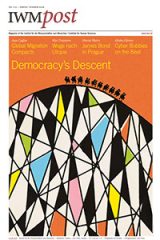

In collaboration with
Institute for Human Sciences
The Institute for Human Sciences / Institut für die Wissenschaften vom Menschen (IWM) is an independent institute for advanced study in the humanities and social sciences. Since its foundation in 1982, it has hosted more than 1500 scholars, journalists and translators from all over the world. Many of the Institute’s Permanent and Visiting Fellows are regular contributors to Eurozine or its focal points The World in Pieces and Ukraine in European Dialogue (see below).
Website: www.iwm.at
Twitter: @IWM_Vienna
Youtube: IWMVienna

Articles
The rise of the NGOs in recent years has raised various new problems, most pressingly that of the “democratisation paradox”: Whilst the NGOs ultimate aim is to promote democratic structures in respective countries, their own structures remain relatively unaccountable and undemocratic. Other questions concern the sharing of power between NGOs and democratically elected chambers and the influence NGOs are able to exert over them. Claus Leggewie looks at the complex mechanisms involved and proposes ways out of the legitimation crisis.
Eurolocal perspectives towards the EU
Imagining the European Union as a nation-state
This text, first published in 2002, describes how in Bulgaria, the EU has replaced the nation state as a symbol of authority. Even local history and culture is being embedded and rewritten in the context of European cultural history. Nevertheless, regional identity won’t get lost, argues the author, since regions “are a configuration of different liminalities enveloping spatial zones of different sizes that overlap and accrue, providing different options.”
Richard Hyman discusses the concept of “solidarities” with regard to trade unions. Once the bastion of “solidarity” for the workers’ collective good, they too have to adopt to changes in the workplace, shifting alliances and new realities. As the traditional models of work (and workers) disappear, how can trade unions adopt and what changes do they need to implement?
The Myth of Two Ukraines
A Commentary on Mykola Riabchuk's "Ukraine: One State, two Countries"?
Most intellectuals agree that Ukraine is dramatically polarized along an East-West axis. The differences manifest themselves in linguistic differences and cultural orientation, especially however in different interpretations of the national history. How can this split be overcome in order to avoid a drifting apart between the ‘europeanized’ West and the more ‘russified’ East?
Focal points

Inspired by a lecture that Clifford Geertz delivered in 1995 at the Institute for Human Sciences in Vienna, this focal point engages with ‘deep diversity’, ‘a sense of dispersion, of particularity, of complexity and of uncenteredness’ rather than unified world order. It follows the launch of a research programme of the same name at the institute in January 2023.

Post-revolutionary Ukrainian society displays a unique mix of hope, enthusiasm, social creativity, collective trauma of war, radicalism and disillusionment. With the Maidan becoming history, the focal point ‘Ukraine in European Dialogue’ explores the new challenges facing the young democracy, its place in Europe, and the lessons it might offer for the future of the European project.
Projects and publications

